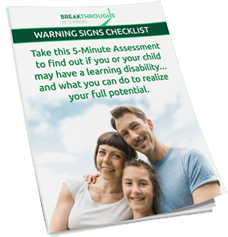
Does it affect life at home, at school or at work?
Take 5 minutes to complete the Warning Signs Checklist and discover whether you or your child could have learning difficulties that are impacting your life, and what to do about it.
Take The Free Warning Signs Checklist!
This month our focus is on getting early access to help or interventions. Far too often we see children, and even adults, who have struggled for years before getting help. Our goal is that by getting children help sooner, we can limit the emotional toll, stop developing behavior issues, and prevent negative attitudes toward school. It’s tough to get excited about going to school when school leaves you feeling like a failure.
Last week we looked at warning signs for Preschool and JK. In addition to those, warning signs that may be observed at the Kindergarten level are:
I am going to highlight a few of these skills in relationship to brainskills. These are just some of the skills from the Warning Signs Checklist. You can get your free copy here. Each one of the struggles listed above indicates a brain skill that may be in need of development. Imagine strengthening these brainskills at the kindergarten level instead of pushing, stressing or fumbling through years of academic struggle.
Speaking too softly or loudly on a consistent basis may indicate that this child is not hearing the sounds within words. It is virtually impossible for this child to replicate a sound that they cannot hear. Many children who have had chronic ear aches as infants may struggle with their ability to hear and differentiate the individual sounds within words. Breakthroughs has an auditory processing program that you can do with your child at home to help develop their ability in this area. Contact us to find out more about this and we can help you assess your child’s ability in this area and provide you with resources to develop this critical skill.
We often encounter clients who struggle to learn or recall words. The brain’s ability to store and retrieve information may be underdeveloped or imbalanced. In order to learn words and later math facts, the brain needs to have a strong enough ability to store information as well as a balanced ability to retrieve this information as it is needed. We have an amazing computer program at the office that is one of the resources we use to build these memory skills. We are able to tell if this skill is needed through part of our Brain Skill Analysis where we assess six different types of memory. If this or any of the other warning signs concern you please don’t hesitate to contact us so we can help you and your child move toward addressing concerns and achieving success.
From my desk to yours: Remember, today is a seed planted for your tomorrow’s breakthrough!
Subscribe to our newsletter and receive regular articles and resources to help you or your child perform better at school, home or work.
suscribe now
Post Your Comment Below